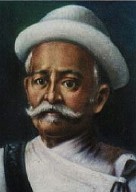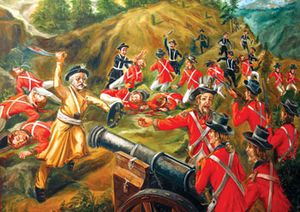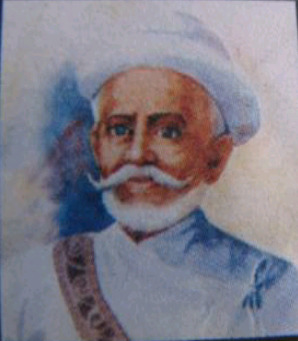Bhakti Thapa facts for kids
Quick facts for kids
Bhakti Thapa (Godar)
|
|
|---|---|
| सरदार भक्ति थापा क्षेत्री |
|

Portrait of Sardar Bhakti Thapa Chhetri in his 70s
|
|
| Grand Old Man of Deothal | |
| Personal details | |
| Born | 1741 Lamjung District, Nepal |
| Died | 1815 (aged 74) Deuthal, Garhwal Division, Kingdom of Nepal (present day Uttarakhand, India) |
| Children | Ram Das Thapa Chhetri |
| Military service | |
| Battles/wars | Anglo-Nepalese war |
Bhakti Thapa Chhetri (Nepali: भक्ति थापा क्षेत्री; 1741 – 1815) was a very brave military leader and administrator in the Kingdom of Nepal. He is considered one of the national heroes of Nepal.
Bhakti Thapa was first a commander for the Kingdom of Lamjung. He fought against the Gorkhali forces. After Lamjung was defeated, he was captured. He was taken to Kathmandu as a prisoner. Later, he joined the Nepali army. He became a supreme commander (Sardar) of the Nepalese army in the western region. This area stretched almost to the Sutlej river. He also managed this region. Bhakti Thapa was a patriot who fought in the Anglo-Nepalese War. His most important fight was at Deothal.
During the Anglo-Nepal War, Sardar Bhakti Thapa led operations in Western Nepal. He was at the fort of Malaun. The British forces controlled the fort of Deuthal, which was close by. On April 16, 1815, Bhakti Thapa, at 74 years old, bravely led 2,000 Nepalese soldiers. They charged into fierce British gunfire. There was intense fighting. About 100 British soldiers were killed. Bhakti Thapa was hit by a bullet while trying to capture a British cannon. Major David Ochterlony respectfully returned his body to the Nepalese army. The next day, he was cremated with full honors. His two wives performed Sati. Before the battle, he had given his grandson to Bada Kaji Amar Singh Thapa. The Anglo-Nepal War changed after this battle. Bhakti Thapa's sacrifice at Deothal became a legend in Nepalese history.
Contents
Bhakti Thapa's Early Life
Bhakti Thapa was born in 1741. His family lived in Dhangai, a small village in Lamjung. Not much is known about his early childhood. However, there is a famous story about him when he was a boy. Many old people in Lamjung still tell this story to young people.
One day, young Bhakti Thapa was sleeping on a large rock. His goats were eating plants in a neighbor's field. An old neighbor woman came out, angry about her field. But what she saw made her blood run cold. Bhakti Thapa was sleeping on a huge snake! The snake was coiled up, with its head raised. It was shading the boy from the hot midday sun. The snake slowly uncoiled and slid away into the bushes.
Bhakti Thapa's parents were very worried when they heard this. They thanked God for saving their son. The old neighbor woman had a different idea. She believed Bhakti Thapa was special. She thought he had some divine power. She was sure he would become a very famous person one day. News of this event quickly spread across Lamjung.
The large rock near Bhakti Thapa's home is linked to his life twice more. Later, a special ceremony was held. Bhakti Thapa formed a brotherhood (metairi) with the rock. The last event linked to the rock happened when Bhakti Thapa died. It is said that when he fell in the Deothal Battle on April 16, 1815, that same rock near his home cracked loudly. The cracked rock is still there today.
The government of Nepal declared him a national hero on July 28, 2021.
Nepal's Unification Campaign
Bhakti Thapa joined Nepal's unification efforts in 1789. At that time, the powerful kingdom of Jumla had stopped the Nepalese army for over two years. Jumla had a huge army of twenty-two thousand men. This was much larger than the Gorkhali forces. In his first big military action, Bhakti Thapa showed amazing skill. He changed the old battle plans. He led an attack on Jumla from a very difficult northern route. This led to a quick victory. Many lives were saved because of his smart strategy.
In just two years, from 1789 to 1791, Nepal's western border grew rapidly. It reached almost the Sutlej River (now in India). Bhakti Thapa played a key role in this fast expansion. At the same time, China attacked Nepal from the north. China was ruled by the powerful Emperor Chiang Lung of the Manchu Dynasty.
Administration in the West
Bhakti Thapa was also an administrator. He received orders from the royal court about stopping slave trading in Garhwal. The order said:
Let not there be injustice in any matter. We had sent orders previously also banning the sale of the children of the subjects, but it seems that the practice has not been abandoned. You are, therefore, ordered to maintain checkposts and do whatever is necessary to put an end to the practice. Any person who is caught while trafficking in human beings shall be punished according to the previous order.
This shows he was in charge of important rules and laws.
Nepal in Great Danger
The Chinese invasion was aimed directly at Kathmandu. The main attack was near Kyrung, north of Kathmandu valley. Nepal knew the Chinese were coming. So, Nepal moved most of its troops and commanders from the west. They needed to defend the capital, Kathmandu. This was a very dangerous time for the new country of Nepal.
Nepal's existence was at risk. The country was in danger of breaking apart. In many areas, old rulers who were unhappy with the new Nepal started causing trouble. Bhakti Thapa, stationed in Kumaun, almost single-handedly stopped this unrest. He was made supreme commander and administrator of the western regions in 1794. He constantly moved across this huge area. He worked hard to keep Nepal from falling apart.
Nepal and China soon realized that continuing the war was not good for either side. They found a way to solve their problems. The fighting stopped. There was no clear winner. After the peace treaty with China, Bhakti Thapa became the governor and chief commander. He was in charge of the entire region from Chepe-Marshyangdi to almost the Sutlej River.
The Anglo-Nepal War

Nepal's expansion across the Himalayan region was very fast. This worried the East India Company greatly. They saw Nepal as a threat to their rule in India. This lasted until the end of the Anglo-Nepal War (1814–16).
The East India Company began preparing for war in 1813. The war was officially declared on November 1, 1814. However, fighting started in mid-October. The decision to go to war was made six months earlier. So, land disputes were likely just an excuse. British forces marched into Nepal across a very long border. They attacked at several points at once. The British had a huge advantage. They had more cavalry, engineers, and many more infantry and artillery. They could also move their troops more easily.
In the first months, the British invasion failed. Nepalese tactics frustrated them. Nepalese forces defended their forts well. They even launched strong counterattacks. These attacks caused big losses for the British.
After these defeats, the British changed their plan. They started using long-range guns. They used these to destroy Nepal's forts from a distance. This new strategy worked. The British quickly moved into Nepal's territory. They even used elephants to carry heavy guns over the mountains. Nepal's ability to defend its land slowly decreased. They were forced to retreat. Their command system started to break down.
By mid-1815, Amar Singh Thapa, the chief of Nepalese forces in the west, was trapped. He was in a small area of the Malaun fort. The future of Nepal depended on Governor General Lord Hastings. He wanted to strengthen Company rule in India. He aimed to either conquer Nepal completely or make it a dependent state. The Battle of Deothal sent a clear message. It showed the East India Company that Nepalese people were determined to protect their country's honor.
The Battle of Deuthal
On April 16, 1815, near sunset, Bhakti Thapa and his soldiers arrived at Malaun fort. They came from Surajgarh without being seen by the British.
The next morning, Bhakti Thapa, at 73 years old, led a brave counterattack. They charged against the East India Company forces at Deuthal. It was 3:15 a.m. when about 400 soldiers under Bhakti Thapa marched out of Malaun fort. They moved slowly to the beat of a drum. The British had cannons hidden. They had two Indian battalions and about 1,000 other soldiers. The British had about 3,500 troops and many weapons.
Bhakti Thapa and his followers seemed ready to fight until death. Bhakti Thapa had even given his baby grandson to Amar Singh Thapa just before the battle. Bhakti Thapa died in the battle. Almost everyone who fought from the Nepalese side was either killed or wounded.
His Great Reputation
The British commanders were very impressed by Bhakti Thapa's bravery at Deothal. Bhakti Thapa became a legend, even to British historians. One historian, CB Khanduri, wrote about him:
- "The words 'BRAVEST OF THE BRAVES' were used by Napoleon for Marshal Ney. Ney showed incredible bravery during the retreat from Moscow in 1812. Napoleon called him BRAVE LES BRAVE. The British later used this phrase for the Gurkhas during and after the Anglo-Nepal War. Bhakti Thapa showed such bravery that a new legend of the Bravest of the Braves was created on April 16, 1815, at Deothal."
 | Aurelia Browder |
 | Nannie Helen Burroughs |
 | Michelle Alexander |


